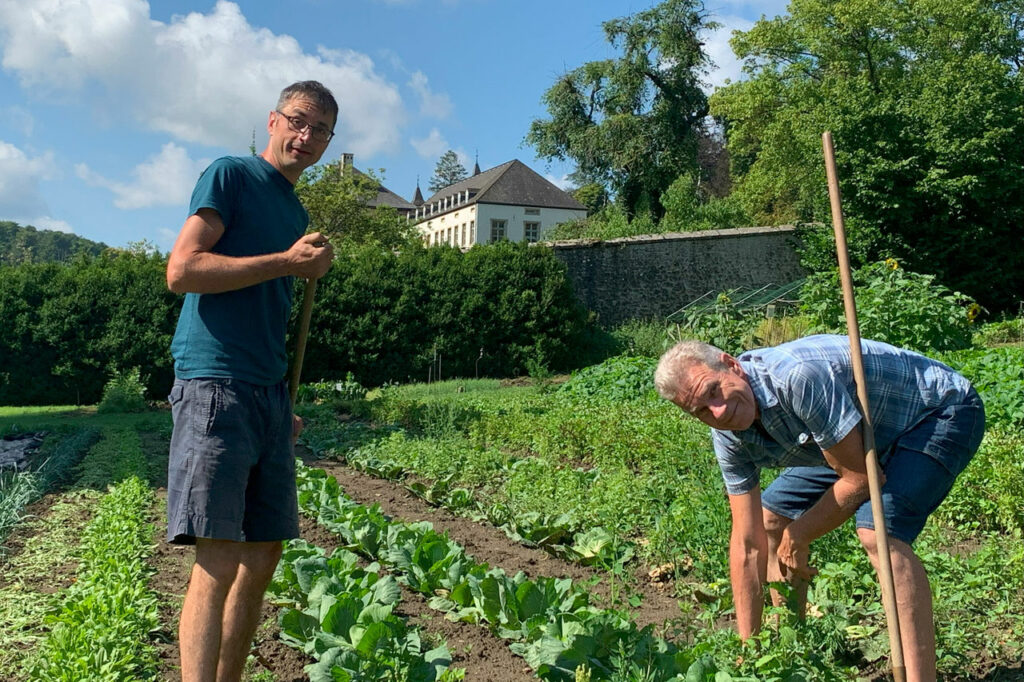The main work of SEED is to preserve the traditional diversity of fruit, cereal and vegetable varieties, but the diversity of wild and cultivated flowering plants and shrubs is also covered. The association organises workshops and lectures, publishes various educational materials and distributes locally produced seeds of vegetables and flowers in Luxembourg. SEED is also involved in political work to raise awareness and support for crop diversity in politics and society.
“Vegetables are the best food you can eat,” explains Frank as we treat ourselves to a breakfast of salads and herbs. “Vegetables are good for your health without any restrictions. You can eat as much as you want. But economically it’s difficult. Local market gardeners can hardly compete with imported vegetables, which are mainly grown on an industrial scale. Gardening in the green belt around cities used to be common everywhere – in Paris, Brussels, Amsterdam and also here on the Kirchberg in Luxembourg.
The city has grown, the farmland has been built on and now there are apartment blocks, shopping centres, banks and EU institutions. The surrounding countryside seems to be lost to vegetable growing. But urban farming is now en vogue with many young people, as I notice in my lessons at school. In practice, however, it is very difficult to get into commercial horticulture. Suitable land is hard to find, product prices are too low and there is not enough public support and advice. The young people also lack professional experience, and all this quickly leads to a 70-hour working week.”
Luxembourg currently only produces around 4% of the vegetables consumed there, compared to just 1% a few years ago. This pleasing increase is due to a gradually growing number of farms and an improving political framework. The political will for more organic products and local jobs exists, but implementation is still too slow and lacking in vigour.
Ultimately, it is mostly state-funded social services that supply a well-earning middle and upper class with local organic vegetables and look after socially disadvantaged people in the process. This may be positive for vegetable production, but overall it is a rather questionable social model.
“I can’t deny it: I love vegetables! What I like to eat the most also grows the best,” smiles Frank. “But love also requires a lot of care. From sowing to selling, there are risks lurking everywhere. I have to prevent diseases and pest infestations if I work without chemicals. The most important point is always prevention, and for me that starts with naturally resistant seeds. In organic farming, I can recognise and understand many ecosystemic relationships, learn from them and view diseases and pests as an adaptation process. They are not just a threat or an enemy. I have been working without pesticides for over thirty years. I want to grow seeds from plants that don’t need “plant protection”, but have a well-functioning natural “immune system”.
Drying room for seeds © Frank Adams
It’s September and the main harvest time for seeds.
Frank takes us to the drying room for the harvested seeds. Here, the ripe seeds are pre-dried on grids and linen cloths before being cleaned and sorted, first by hand and then using special machines.
SEED has been organising seed growing courses and distributing seeds to hobby gardeners since 2012. The agricultural school has coordinated the production and marketing of organically certified vegetable seeds to local commercial nurseries. The school’s teaching programme also includes special courses on seed cultivation.
“Despite the progress made in the new EU organic regulation with regard to the development and marketing of organic seed,” says Frank, “it is still difficult to expand the genetic base in the vegetable sector by registering and registering new varieties suitable for agro-ecological cultivation. But this is important work. I hope we can make progress soon and also achieve the necessary recognition and support in politics!”
Adam(s) wants to return to paradise, some people joke about Frank, who describes his method as “ecosystemic cultivation”. Instead of hostile opposition, Frank sees horticultural work as symbiotic co-operation.
“We have increasingly marginalised nature from production, first through pesticides and now through biotechnology. I am convinced that biotechnology will never be able to replace the ecosystemic development and adaptation processes in seeds. On the one hand, many fundamental characteristics in the genetics of plants are predisposed in a very complex, so-called multigenic way. On the other hand, there are ecosystemic phenomena such as epigenetic mechanisms and multi-layered microbial interactions. Even though it may sound paradoxical, the incredible progress that genetic research has made in recent decades suggests to me that biotechnology in plant breeding cannot work in the long term,” Frank explains.
“I believe that organic and agroecological food production can feed the world if we focus more on sustainable quality than on short-term quantity. For me, this also means having reproducible seeds on farms and in gardens that can continuously adapt to a wide range of environmental changes without genetic engineering and pesticides.
Even if genetic engineering promises to be able to accelerate adaptation to climate change, I do not believe that the “new genomic techniques”, which are now being presented by interested parties as a panacea, can replace the adaptability of crop diversity and agroecological cultivation methods.”
More on seeds
True Bread – the Restorative work of Farmers, Millers & Bakers in Hungary
A Leek for Change! The Belgian Trio on a Mission to Save Seeds
Greece | The Sisters of the Seeds
Târ y donc a tori – Lessons on the Subversive Nature of Transmission, from a Stubborn Welshman
Letter from the Farm | Wild Geese and Tamed Farming – is it All for the Birds?
Letter From A Future Farmer | Rethinking The Farm From The Ground Up
Letter From The Farm | Rural Digitalisation Remains a Hard Sell
Source link : http://www.bing.com/news/apiclick.aspx?ref=FexRss&aid=&tid=66f2b2668ae74242b7a6a67f666159af&url=https%3A%2F%2Fwww.arc2020.eu%2Fluxembourg-a-good-gardener-is-a-teacher-and-politician%2F&c=3510519598948448016&mkt=en-us
Author :
Publish date : 2024-09-24 02:55:00
Copyright for syndicated content belongs to the linked Source.
